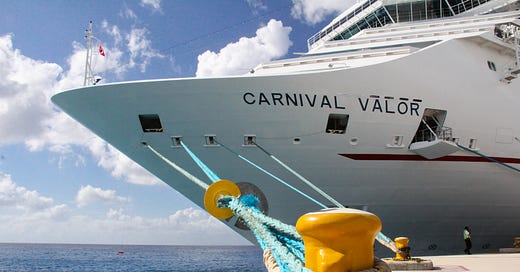No Cruise Bailout Without Conditions
You want our money due to coronavirus? Stop the tax dodging and the labor abuses.

With the response to coronavirus at all levels of government beginning to take more of a concrete shape, it’s becoming increasingly clear that the Trump administration is interested in some sort of bailout for industries closely connected to the pandemic’s immediate effects, such as airlines, hotels, and cruise lines. A plan could be released to help those industries as early as this week — though Treasury Secretary Steven Mnuchin is begging that whatever intervention occurs not be called a bailout.
In the New York Times, Tim Wu explained why any aid to big airlines needs to be connected to reforms that address many of the abuses they have foisted upon customers and workers in recent years. Indeed, if the government is going to step in and save a particular industry — any industry — it needs to set conditions that benefit the public. The government has leverage and needs to use it.
Which brings us to the cruise industry, which at this time has largely ceased U.S. operations — after one company was caught lying to potential customers about coronavirus in order to entice them onto floating petri dishes in the middle of a pandemic.
At least with airlines there’s a plausible case to be made that the industry is a national necessity. Not so much with cruises. But the Trump team seems insistent on helping the industry anyway. So if big cruise corporations receive help, here’s what, at a minimum, the government needs to demand:
1) No aid without guarantees against layoffs. Since the people most harmed by the slowdown in travel-related businesses will be the hourly- and other low-wage staff who are always the first on the chopping block in hard times, any government rescue needs to come with a guarantee that current workers will continue to be paid in full until business is up and running again. This should be true of any industry receiving coronavirus-linked government aid.
2) Close the tax loophole. The U.S. tax code allows cruise companies, though headquartered mostly in Florida, to register their ships in foreign countries and thus avoid U.S. taxes. The U.S. tax rate of major cruise companies is just 0.8 percent. Another estimate has cruise companies paying just a 1.3 percent tax rate worldwide on more than $17 billion in profits, since they tend to register ships in low- or no-tax countries.
Even a tiny potential tax hike of just $70 million was pulled from the 2017 Trump tax cut bill after the cruise industry got to a Republican senator.
Meanwhile, when cruise ships get in trouble, it’s the U.S. taxpayer that foots the bill for Coast Guard rescue operations.
If cruise companies want U.S. money, they need to start paying into the pot in the future. No registering as U.S. companies and paying U.S. taxes, no bailout.
3) Crack down on labor abuses. Another byproduct of that foreign registering is cruise companies don’t have to abide by U.S. labor law. So their mostly non-U.S. workforces toil in awful conditions for low pay. Public money should be conditioned on the adoption of U.S. labor and wage standards for all workers on cruise ships whose companies are headquartered in the U.S.
4) Limits on executive compensation and lobbying. As Matt Stoller wrote, companies receiving bailout funds should have strict limits placed on their political activity, so they can’t turn around and rewrite the new rules once the crisis has subsided. Ditto for executives walking away with huge bonuses paid for by taxpayers that can then be plowed into new political donations.
Similar conditions should be put on any other industry that receives government aid; and this is by no means an exhaustive list of options. And look, there’s certainly a case to be made for simply letting cruise companies and other travel-related businesses sink and protecting workers through other means, such as unemployment insurance and job placement and retraining. Rather than industry specific, nationwide efforts to protect workers and small businesses hurt by coronavirus through no fault of their own are vastly superior to specific bailouts for specific, usually big, businesses.
But there’s simply no reason, if taxpayers are going to step in to save an industry, that the industry should be able to take advantage of taxpayers as a thank you.
Thanks for reading this edition of Boondoggle. If you don’t subscribe already, just click the green button below.
If you liked this post, take a moment and click the little heart under the headline or below. It helps.
If you’re already a subscriber, please forward this around to friends, family, neighbors, or whoever you think might like it, and tell them to sign up too.
Finally, if you’d like to pick up a copy of my book, The Billionaire Boondoggle, go here. Thanks again!
— Pat Garofalo


